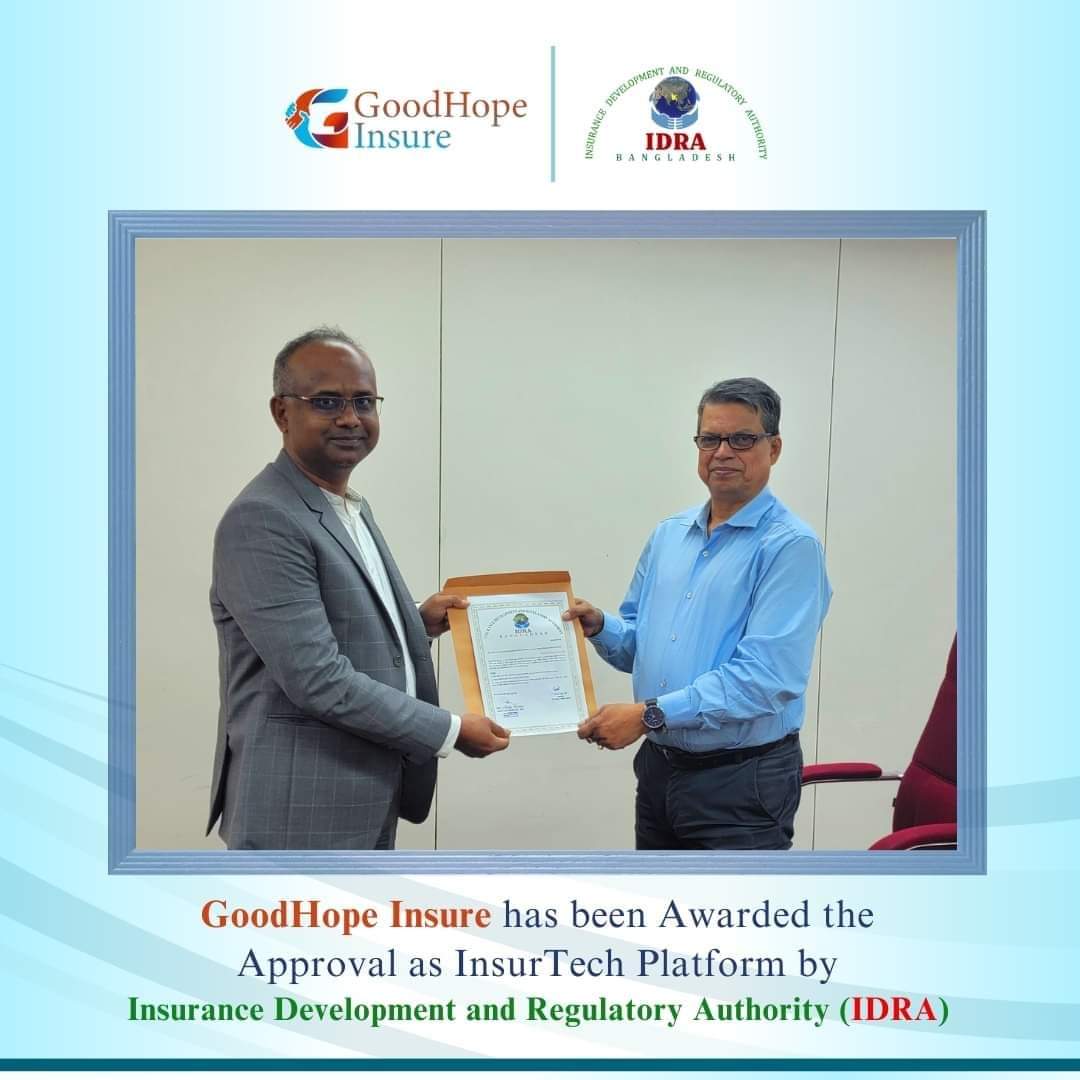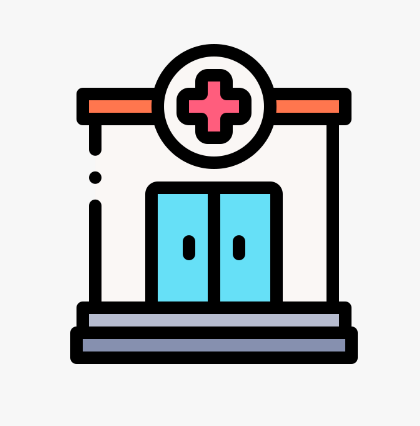Health Insurance
Health Insurance in Bangladesh
As healthcare costs continue to rise worldwide including Bangladesh, having a reliable health insurance plan is more important than ever. GoodHope Insure, a leading InsurTech platform, is transforming the health insurance landscape by offering innovative, affordable, and customizable solutions tailored to the diverse needs of individuals, families, and corporates.
At GoodHope Insure, we understand that navigating the complexities of health insurance can be overwhelming. That's why we have made it our mission to simplify the process and provide our clients with the best possible coverage options. Our experienced team works diligently to design health insurance plans that cater to your unique requirements and budget, ensuring you have access to quality healthcare without financial strain.
By choosing GoodHope Insure, you gain access to a wide network of top-tier hospitals, clinics, and healthcare providers across Bangladesh. Our advanced technology platform ensures a seamless experience, from policy purchase to claim filing and getting reimbursement. With our user-friendly online portal and mobile app, managing your health insurance has never been more convenient.
What sets us apart is our unwavering commitment to client satisfaction. We believe in building long-term relationships based on trust, transparency, and exceptional service. Our dedicated customer support team is available 24/7 to address your concerns and provide guidance whenever needed. We also offer value-added services, such as free annual health check-ups and wellness programs, to help you prioritize your health.
At GoodHope Insure, we believe everyone deserves access to quality healthcare without financial worry. Whether you're an individual, family, or corporate decision-maker, we have the perfect health insurance solution for you. Take the first step towards safeguarding your health and finances by exploring the options available through GoodHope Insure. Contact us today and let us help you find the peace of mind you deserve.
What is Health Insurance
Health insurance, also known as medical insurance or health coverage, is a contract between an individual (the policyholder) and an insurance company, designed to provide financial protection against medical expenses. By entering into this agreement, policyholders pay regular premiums to the insurer, who in turn agrees to cover a portion or all of the medical costs incurred by the insured individual.
The primary purpose of health insurance is to help manage healthcare costs and ensure access to quality care. With the rising cost of medical treatments, hospitalization, and medication, having a healthcare plan can make a significant difference in an individual's ability to afford necessary healthcare services.
Why do We Need Health Insurance?
The importance of health insurance cannot be overstated, especially in today's world where a single medical emergency can lead to financial distress. Here are some key reasons why medical coverage is essential:
-
Rising healthcare costs
Medical expenses have been increasing at an alarming rate, making it difficult for individuals and families to manage these costs out-of-pocket. Health insurance helps mitigate the financial burden by covering a significant portion of these expenses.
-
Protection against unexpected medical emergencies
Accidents and illnesses can strike without warning, leading to unexpected hospitalizations and costly treatments. A health care plan provides a safety net in such situations, ensuring that you can access the necessary care without worrying about the financial implications.
-
Access to timely and quality healthcare services
With health insurance, policyholders are more likely to seek preventive care and timely medical attention for health concerns. This not only improves overall health outcomes but also helps detect potential health issues early on, leading to more effective and less costly treatments in the long run.
-
Peace of mind
Knowing that you and your family are protected against the financial consequences of medical emergencies can provide immense peace of mind. This allows you to focus on your health and recovery, rather than worrying about how to pay for the medical bills.
What Does Health Insurance Cover?
Health care plans offer a wide range of coverage options, depending on the policy and the insurer. Generally, most health insurance plans cover the following:
-
Hospitalization expenses: This includes room charges, nursing expenses, and the cost of medical procedures and surgeries performed during the hospital stay.
-
Pre and post-hospitalization expenses: Many policies cover medical expenses incurred before and after hospitalization, such as diagnostic tests, consultations, and follow-up visits.
-
Ambulance charges: The cost of emergency ambulance services is often covered under medical insurance plans.
-
Prescription medications: Most plans cover the cost of medications prescribed by a licensed healthcare provider, subject to certain limitations and exclusions.
-
Doctor consultations: Regular check-ups and consultations with doctors, both in-person and online, are often covered under health care plans.
It is essential to carefully review the specific coverage offered by a health insurance policy before purchasing it to ensure that it meets your healthcare needs.
Who Needs Health Insurance Plans?
While everyone can benefit from having health insurance, certain individuals and groups may have a higher need for comprehensive coverage:
-
Individuals and families: Regardless of age or health status, having medical insurance is crucial for managing healthcare costs and accessing necessary medical care.
-
Those with pre-existing health conditions: Individuals with chronic illnesses or pre-existing medical conditions often require regular medical attention and costly treatments, making health coverage a vital necessity.
-
Elderly individuals: As people age, the likelihood of developing health problems increases, making health insurance an essential consideration for seniors.
-
Pregnant women: Maternity care and childbirth expenses can be significant, and having a health care plan can help manage these costs and ensure access to quality prenatal and postnatal care.
-
Self-employed and freelance workers: Without access to employer-sponsored health insurance, self-employed individuals and freelancers need to secure their own medical coverage to protect against healthcare expenses.
We advise individuals and families to carefully assess their healthcare needs and budget when selecting an affordable health insurance plan. It is also important to review and update your coverage regularly to ensure that it continues to meet your changing healthcare requirements.
Government Health Insurance Programs
The government of Bangladesh offers several health insurance programs aimed at providing healthcare access to specific segments of the population:
-
Shasthyo Surokhsha Karmasuchi (SSK)
-
Shasthyo Surokhsha Karmasuchi (SSK) is a government-sponsored health insurance program that provides free healthcare services to poor and vulnerable populations in Bangladesh.
-
The program covers inpatient and outpatient services at designated government healthcare facilities, ensuring access to essential medical care for those who may otherwise be unable to afford it.
-
-
Shasthyo Shurokhsha Karmashuchi (SSK) Outpatient Pilot Program
-
The SSK Outpatient Pilot Program is an extension of the original SSK program, designed to include outpatient services in the coverage.
-
This initiative aims to reduce out-of-pocket expenses for beneficiaries and improve access to preventive and primary healthcare services.
-
While these government programs provide crucial support to vulnerable populations, they may have limitations in terms of coverage and the range of healthcare providers accessible to beneficiaries.
Private Health Insurance Plans
Private health insurance plans offer a more comprehensive and customizable alternative to government-sponsored programs. These plans are designed to cater to the diverse healthcare needs of individuals, families, and employers.
-
Group Health Insurance
Group health insurance plans are offered by employers to their employees (and their dependents) as part of their benefits package. These plans have several advantages:
-
Features of Group Health Insurance
- Group health insurance covers a group of people, usually employees of a company, under a single policy.
- Insurance premiums for group plans are often lower compared to individual plans due to the risk pooling effect.
- Employers can customize the coverage options based on the specific needs of their workforce.
-
Benefits of Group Health Insurance
- Offering group health insurance can help employers attract and retain talented employees by providing a valuable benefit.
- By investing in the health of their employees, companies can improve overall employee well-being, productivity, and job satisfaction.
- Both employers and employees may be eligible for tax benefits when participating in a group health insurance plan.
-
-
Individual Health Insurance
For those who do not have access to employer-sponsored health insurance or prefer more personalized coverage, individual health insurance plans are a viable option.
-
Features of Individual Health Insurance
- Individual health insurance plans are tailored to meet the specific needs and preferences of the policyholder.
- These plans offer flexibility in choosing coverage levels, sum insured, and additional benefits.
- Individual plans are portable, meaning the policyholder can continue their coverage even if they change jobs or retire.
-
Benefits of Individual Health Insurance
- Individual health insurance provides comprehensive coverage for medical expenses, offering financial security and peace of mind.
- Policyholders can choose a plan that aligns with their budget and healthcare requirements.
- With an individual plan, the policyholder has greater control over their healthcare decisions and can select the healthcare providers they prefer.
-
It is recommended to consult with a qualified insurance professional to understand the various options available and make an informed decision.
Financial Protection Against High Medical Costs
One of the primary reasons for the importance of health insurance in Bangladesh is the financial protection it offers against the high cost of medical care. Consider the following:
-
Medical expenses, including hospitalization, surgery, and medication, can quickly accumulate and drain an individual's savings, leading to financial strain and even debt.
-
Health insurance helps manage and mitigate these costs by covering a significant portion of the expenses, reducing the financial burden on the policyholder.
Access to Quality Healthcare Services
Health insurance plays a crucial role in ensuring access to quality healthcare services in Bangladesh:
-
With health insurance, policyholders can receive treatment at the best healthcare facilities without worrying about the cost.
-
Policyholders can benefit from cashless treatment at network hospitals, eliminating the need for upfront payments and reducing the financial stress during medical emergencies.
-
Health insurance enables individuals to seek timely medical care, leading to better health outcomes and improved quality of life.
Peace of Mind for Individuals and Families
The peace of mind that comes with having health insurance cannot be overstated:
-
Knowing that medical expenses are covered, individuals and families can focus on recovery and well-being rather than worrying about the financial implications of a health crisis.
-
Health insurance provides a sense of security, allowing policyholders to make healthcare decisions based on their needs rather than financial constraints.
As Bangladesh continues to develop and the healthcare landscape evolves, the importance of health insurance will only continue to grow. By prioritizing health insurance, individuals, employers, and the government can work together to create a more resilient and equitable healthcare system for all.
Factors to Consider When Choosing a Health Insurance Plan
Selecting the right health insurance plan is a crucial decision that requires careful consideration of various factors. we recommend keeping the following points in mind when choosing a policy:
-
Coverage Levels and Limits
-
Assess your healthcare needs and choose a plan with coverage levels that align with your requirements.
-
Pay attention to the sum insured, which is the maximum amount the insurer will pay for covered medical expenses during the policy term.
-
Consider any sub-limits or caps on specific treatments, such as room rent or surgical procedures, to ensure that the coverage is adequate.
-
-
Network of Hospitals and Healthcare Providers
-
Check if your preferred hospitals and doctors are included in the insurance company's network of healthcare providers.
-
A wide network of cashless facilities can provide convenience and reduce out-of-pocket expenses during medical emergencies.
-
If you have a specific healthcare provider in mind, ensure that they are part of the insurer's network before purchasing the policy.
-
-
Pre-existing Condition Clauses
-
Understand how the insurance company handles pre-existing medical conditions and any related waiting periods or exclusions.
-
Some policies may require a waiting period before coverage for pre-existing conditions kicks in, while others may exclude them entirely.
-
If you have a pre-existing condition, look for a plan that offers the most favorable terms for your specific situation.
-
-
Waiting Periods for Certain Treatments
-
Be aware of any waiting periods for specific treatments, such as maternity care or surgeries.
-
These waiting periods can range from a few months to several years, during which the policyholder may not be eligible for coverage related to those treatments.
-
Planning ahead and purchasing a policy well in advance can help ensure that you are covered when you need it most.
-
-
Premium Costs and Payment Options
-
Compare the premium costs of different health insurance plans to find one that fits your budget.
-
Keep in mind that while lower premiums may be attractive, they often come with higher deductibles or co-payments.
-
Look for insurers that offer flexible payment options, such as monthly or quarterly premiums, to make the policy more affordable.
-
-
Check the Sum Insured
-
Ensure that the sum insured is sufficient to cover your potential medical expenses, considering factors such as the rising cost of healthcare and inflation.
-
A higher sum insured may come with higher premiums but can provide better financial protection in case of a serious medical emergency.
-
-
Scout the Network Hospital
-
Choose a plan with a wide network of hospitals and clinics to ensure that you have access to quality healthcare facilities when needed.
-
A larger network of cashless hospitals can provide greater convenience and flexibility, especially in case of emergencies or when traveling.
-
-
Check the Fine Print
-
Carefully read the policy document to understand all the terms, conditions, and exclusions of the health insurance plan.
-
Look for any hidden clauses or limitations that may affect your coverage, such as room rent caps or co-payment requirements.
-
If you have any doubts or concerns, do not hesitate to ask questions and seek clarification from the insurer or a qualified insurance professional.
-
-
Look for Additional Benefits
-
Some health insurance plans offer additional benefits, such as free annual health check-ups, wellness programs, or telemedicine services.
-
These benefits can help you maintain better health and detect potential issues early, leading to more effective and less costly treatments in the long run.
-
-
Examine the Exclusions and Other Clauses
-
Familiarize yourself with the exclusions and limitations of the policy to avoid any surprises when making a claim.
-
Common exclusions may include cosmetic treatments, self-inflicted injuries, or experimental procedures.
-
Pay attention to clauses related to room rent limits, co-payments, and sub-limits, as these can impact your out-of-pocket expenses.
-
By carefully considering these factors and seeking guidance from a health insurance expert when needed, you can make an informed decision and choose a health insurance plan that best suits your needs and budget.
Common Exclusions in Health Insurance Policies
While health insurance policies offer valuable financial protection, it is essential to understand that not all medical expenses are covered. Most policies come with certain exclusions, which are conditions or treatments that are not eligible for coverage. Some common exclusions in health insurance policies include
-
Cosmetic and Elective Procedures
-
Most health insurance policies do not cover cosmetic treatments, such as plastic surgery or hair transplantation unless they are deemed medically necessary due to an accident or injury.
-
Elective procedures, like laser eye surgery or weight loss surgery, are also commonly excluded from coverage.
-
-
Pre-existing Conditions (for a specified period)
-
Pre-existing medical conditions are often excluded from coverage for a certain period after purchasing the policy, known as the waiting period.
-
The duration of this waiting period varies among insurers and plans, typically ranging from one to four years.
-
After the waiting period, coverage for pre-existing conditions may be available, subject to certain terms and conditions.
-
-
Maternity Benefits (for a specified waiting period)
-
Maternity benefits, including expenses related to childbirth and prenatal care, are usually subject to a waiting period.
-
This waiting period can range from 9 months to 48 months, depending on the insurer and the plan.
-
Some policies may offer limited coverage for maternity expenses or have sub-limits in place.
-
-
Dental and Vision Care
-
Basic health insurance plans often exclude dental and vision treatments, such as teeth cleanings, fillings, or prescription glasses.
-
Separate dental and vision insurance plans or riders may be available for an additional premium to cover these specific needs.
-
-
Other common exclusions may include
-
Treatment for substance abuse or self-inflicted injuries
-
Treatment for Birth defect or congenital diseases
-
Experimental or unproven treatments
-
Fertility treatments and birth control
-
Alternative therapies, such as acupuncture or homeopathy
-
We advise policyholders to carefully review the exclusions and limitations of their chosen plan to avoid any misunderstandings or disappointment when making a claim. If you have specific healthcare needs or concerns, it may be worth considering a more comprehensive plan or opting for additional riders to ensure adequate coverage.
Claim Settlement Process for Health Insurance in Bangladesh
Filing a health insurance claim can be a daunting task, especially during a medical emergency. We have guided numerous policyholders through the claim settlement process and have seen firsthand the importance of understanding the required documents and timelines. Here's what you need to know:
-
Required Documents for Reimbursement Claims
When filing a reimbursement claim, you will need to submit the following documents to your insurance company:
-
A duly filled and signed claim form, which can be obtained from the insurer's website or customer service center.
-
Original hospital bills, receipts, and payment vouchers detailing the medical expenses incurred.
-
Doctor's prescription and medical reports, including diagnostic test results and hospital discharge summary.
-
A copy of the policyholder's ID card and the patient's government-issued identification.
It is crucial to ensure that all documents are complete, accurate, and submitted in a timely manner to avoid any delays in claim processing.
-
-
Timeframe for Submitting Claims
Most insurance companies in Bangladesh require policyholders to submit reimbursement claims within a specific timeframe after the date of discharge from the hospital. This timeframe can range from 15 to 30 days, depending on the insurer and the policy terms. To ensure a smooth claim settlement process, we recommend the following:
-
Notify your insurance company about the hospitalization as soon as possible, preferably within 24 hours of admission.
-
Collect all the necessary documents during the hospital stay and immediately after discharge.
-
Submit the complete set of documents to the insurer within the stipulated timeframe.
If you face any difficulties or have questions about the claim process, do not hesitate to reach out to GoodHope Insure’s customer service team for assistance.
-
-
Claim Processing and Payment Timeline
Once you have submitted the required documents, GoodHope Insure on behalf of the insurance company will verify the information and process your claim. Here's what you can expect:
-
The insurer will review the submitted documents to ensure they are complete and meet the policy terms and conditions.
-
If any additional information or clarification is needed, the insurer will contact you or the healthcare provider.
-
After the claim is validated, the insurance company will calculate the eligible amount based on your policy's coverage, sub-limits, and deductibles.
-
The claim amount will be paid directly to the policyholder's registered bank account, usually within 15 to 30 days from the date of submission of all required documents.
In case of any delays or discrepancies in the claim settlement process, it is essential to follow up with GoodHope Insure or the insurance company and provide any additional information they may require. We also recommend regularly updating your contact and bank account details with the insurer to ensure a seamless claim experience.
-
GoodHope Insure: Your Trusted Health Insurance Partner
-
About GoodHope Insure
GoodHope Insure is a leading InsurTech platform in Bangladesh, dedicated to revolutionizing the health insurance landscape through innovative products, seamless services, and a customer-centric approach. With a vision to make health insurance accessible and affordable for all, GoodHope Insure offers a wide range of health insurance solutions catering to the diverse needs of individuals, families, and corporations.
-
Our Commitment to Client Satisfaction
At GoodHope Insure, we believe in putting our clients first. Our team of experienced professionals is committed to delivering exceptional service and support, ensuring that our policyholders have a seamless experience from policy purchase to claim settlement. We understand that navigating the world of health insurance can be overwhelming, which is why we have dedicated ourselves to being your trusted partner every step of the way.
Comprehensive Health Insurance Solutions
-
GoodHope Family Health Insurance Packages
Our flagship product, GoodHope Family Health Insurance, offers comprehensive coverage for you and your loved ones. With four tailored packages to choose from, you can select the plan that best fits your family's healthcare needs and budget. Some of the key features and benefits include:
-
Hospital expense reimbursement with daily cash limits and annual coverage up to Tk. 60,000.
-
Cashless hospitalization at our extensive network of partner hospitals and clinics.
-
Free life insurance coverage for the primary insured member.
-
Affordable annual premiums starting from as low as Tk. 240.
-
-
Customizable Group Health Insurance Plans
We understand that every organization has unique healthcare requirements. That's why we offer customizable group health insurance plans designed to cater to the specific needs of your employees. Our group health insurance solutions provide:
-
Flexible coverage options and sum insured to suit your organization's budget and requirements.
-
Comprehensive coverage for hospitalization, pre and post-hospitalization expenses, and more.
-
Dedicated account management and support for seamless employee enrollment and claim processing.
-
Competitive premium rates and valuable employee benefits to attract and retain top talent.
-
Value-Added Services for Policyholders
At GoodHope Insure, we go beyond traditional insurance offerings to provide our policyholders with a range of value-added services:
-
24/7 Customer Support
Our dedicated customer support team is available round the clock to assist you with any policy-related queries, claim guidance, or emergency assistance. Whether you need help with understanding your coverage or require support during a medical emergency, we are just a call away.
-
Online Policy Management
We offer a user-friendly online portal that allows policyholders to easily manage their health insurance plans from the comfort of their homes. Through the portal, you can:
-
View and download policy documents and tax certificates.
-
Update personal information and contact details.
-
Track claim status and history.
-
Access a wide range of health and wellness resources.
-
-
Extensive Network of Healthcare Providers
To ensure that our policyholders have access to quality healthcare, we have partnered with an extensive network of hospitals, clinics, and diagnostic centers across Bangladesh. Our network includes some of the most renowned healthcare providers in the country, offering cashless hospitalization and discounted health check-ups for our policyholders.
Whether you are an individual looking for personal coverage or a corporate decision-maker exploring group health insurance options, we are here to support you every step of the way.
People Also Ask
Answer:
- Government health insurance programs, such as Shasthyo Surokhsha Karmasuchi (SSK), are initiated and funded by the government to provide healthcare coverage to specific segments of the population, often focusing on low-income and vulnerable groups.
- Private health insurance, on the other hand, is offered by insurance companies and can be purchased by individuals, families, or organizations. These plans provide more comprehensive and customizable coverage options, allowing policyholders to choose the benefits and features that best suit their needs.
Answer:
- Yes, you can purchase health insurance even if you have a pre-existing medical condition. However, most insurance companies have a waiting period for pre-existing conditions, during which the policyholder may not be eligible for coverage related to that specific condition.
- The length of the waiting period varies among insurers and plans, typically ranging from one to four years. After the waiting period, coverage for the pre-existing condition may be available, subject to the policy's terms and conditions.
Answer:
To file a claim for reimbursement of medical expenses, follow these steps:
- Notify GoodHope Insure about the hospitalization as soon as possible, preferably within 24 hours of admission.
- Collect all the necessary documents, including hospital bills, receipts, doctor's prescription, and medical reports.
- Fill out the claim form provided by GoodHope and submit it along with the required documents within the specified timeframe (usually 15 to 30 days from the date of discharge).
- GoodHope, on behalf of the insurance company will verify the submitted documents and process the claim. If any additional information is needed, they will contact you or the healthcare provider.
- Once the claim is approved, the eligible amount will be reimbursed to your registered bank account within the stipulated time frame.
Answer:
- Yes, some InsurTech platforms or insurance companies offer discounts on health insurance premiums to encourage individuals to purchase and maintain coverage. These discounts may include:
- Online purchase discounts for buying the policy through GoodHope’s website or mobile app.
- Long-term policy discounts for purchasing a multi-year policy instead of annual renewals.
- Family floater discounts for insuring multiple family members under a single policy.
- Employee group discounts for organizations purchasing group health insurance for their employees.
- It is essential to compare different insurance providers and their discount offers to find the most cost-effective option that meets your healthcare needs. You may get the information of discounts on GoodHope Insure’s platform.
Answer:
To compare different health insurance plans and make an informed decision, consider the following factors:
- Coverage: Examine the benefits, inclusions, and exclusions of each plan to ensure it covers your specific healthcare needs.
- Sum insured: Evaluate the maximum coverage amount offered by each plan and choose one that adequately covers your potential medical expenses.
- Network hospitals: Check the list of network hospitals and healthcare providers associated with each plan to ensure easy access to quality medical care.
- Premium costs: Compare the annual premium prices of different plans, taking into account any applicable discounts or additional fees.
- Sub-limits and deductibles: Look for any sub-limits on specific treatments or room rent, as well as the deductible amount you will need to pay out-of-pocket before the insurance coverage kicks in.
- Claim settlement process: Research the claim settlement ratio and process of each insurer to gauge their reliability and efficiency in handling claims.
You can also use online comparison tools or seek the advice of a health insurance expert at GoodHope Insure to help you compare plans and make the best choice for your needs and budget.
Answer:
- It is advisable to purchase health insurance as early as possible, ideally when you are young and healthy. This is because:
- Premiums are generally lower for younger individuals, as they are considered to be at a lower risk of developing health problems.
- Buying health insurance early allows you to accumulate a longer history of continuous coverage, which can be beneficial when you need to make a claim.
- Waiting until you are older or develop a health condition may result in higher premiums or difficulty in obtaining coverage.
- However, it is never too late to invest in health insurance. Even if you are in your 40s, 50s, or beyond, having health insurance can provide crucial financial protection against unexpected medical expenses.
Answer:
- Most health insurance policies in Bangladesh do not have a limit on the number of claims you can make in a year. However, there may be limits on the total amount that can be claimed, based on the sum insured and any sub-limits specified in the policy.
- For example, if your policy has a sum insured of Tk. 5 lakhs and you have already claimed Tk. 4 lakhs in a year, you will only be eligible to claim the remaining Tk. 1 lakh for any subsequent hospitalizations in that policy year.
- It is essential to review your policy documents carefully to understand any limitations on the number or amount of claims you can make in a year.
Answer:
If you are dissatisfied with your health insurance policy, you have several options:
- Reach out to the customer service team of GoodHope or the insurance provider and express your concerns. They may be able to offer a solution or provide clarification on the issue.
- If you are not satisfied with the response from your insurer, you can escalate the matter to their grievance redressal department. Insurance companies are required to have a dedicated grievance redressal mechanism to address policyholder complaints.
- If the issue remains unresolved, you can approach the Insurance Development and Regulatory Authority (IDRA) of Bangladesh. IDRA is responsible for regulating the insurance industry and protecting the interests of policyholders.
- As a last resort, you may consider switching to a different insurance provider or policy that better meets your needs and expectations. However, keep in mind that waiting periods and other terms and conditions may apply when switching policies.
Answer:
- In most cases, if you avail of cashless treatment at a network hospital, you do not have to pay anything out-of-pocket. The insurance company will settle the bill directly with the hospital, up to the sum insured and subject to the policy's terms and conditions.
- However, there may be instances where you have to bear some costs despite having a cashless claim facility, such as:
- If the hospital charges more than the rates agreed upon with the insurance company, you may have to pay the difference.
- If you opt for a higher room category or services that are not covered under your policy, you will have to pay for those expenses out-of-pocket.
- If your policy has a co-payment clause, where you are required to pay a portion of the claim amount, you will have to bear that cost.
- To avoid any surprises, it is crucial to understand your policy's terms, conditions, and limitations before availing of cashless treatment.
If you have any further questions or need assistance in choosing the right health insurance plan for your needs, please do not hesitate to reach out to the GoodHope Insure team. We are here to help you protect your health and finances with the best possible insurance solutions.






